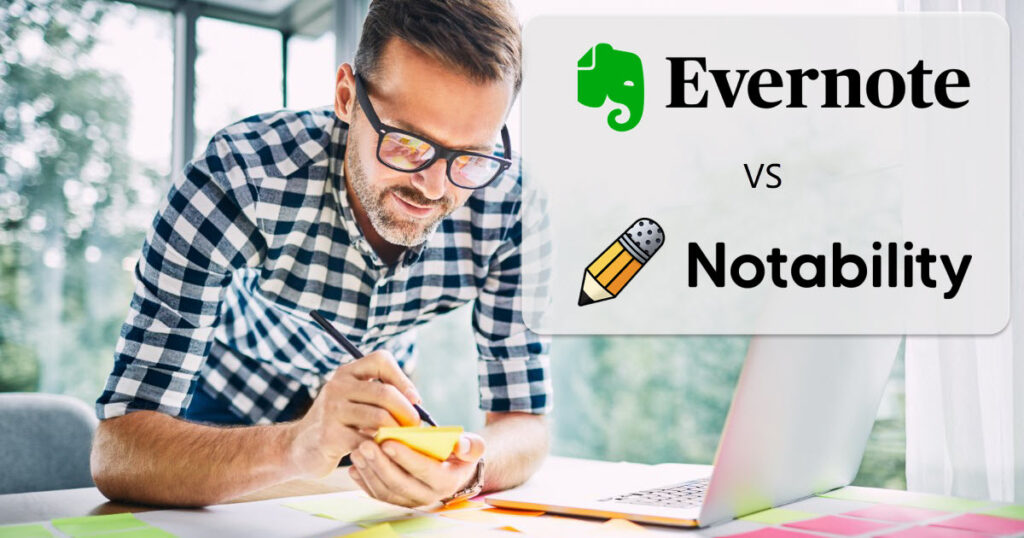Struggling to pick the right note-taking app? Overwhelmed by the Evernote vs Notability debate and the added comparison with Google Docs and Microsoft Word? Let’s cut to the chase.
I understand the confusion – picking the right app can be tricky with so many features and benefits to consider. But, that’s precisely why I’ve taken a deep dive into each of these platforms.
The right note-taking app can help in the process you do your work. Whether it’s Evernote’s exhaustive functionalities or Notability’s unique blend of writing and drawing tools, I’ve got you covered.
Don’t wait. Let’s explore these platforms together so that you can make the best choice for your productivity.
Overview of Evernote

Evernote is a note-taking app that lets you create, find and organize all your notes across multiple devices. It’s available on Windows, MacOS, Android, and iOS.
Evernote allows users to take photos of text or handwriting and add audio recordings. The app also syncs with other platforms, such as Microsoft OneNote, so that you can access your notes from different locations simultaneously.
Disadvantages of Evernote
Evernote is not free. If you’re on a tight budget and looking for an app that will help you save money, Evernote is not the way to go.
Evernote doesn’t have a web interface. If you’re sitting at home trying to work on something important but don’t have access to your phone or tablet (or if they’re dead), then Evernote won’t be much help to you until you get back online with one of those devices again.
Evernote has limited functionality on iOS devices—especially compared with Notability’s mobile apps for both Android and iOS devices!
Overview of Notability

Notability is a note-taking app for Mac and iOS. It has a clean UI, which makes it easy to use, even for beginners.
It also has many features and integrations that will help you take your notes from plain text to beautiful visuals without switching between apps or losing any data in the process!
Notability isn’t free, but if you’re willing to pay $14.99 monthly for this app, we highly recommend trying it!
Disadvantages of Notability
Notability is not free, which makes it a harder sell for those who don’t want to pay for an app. It’s also not the most user-friendly, so if you’re looking for something simple and straightforward, this may not be the right choice for you.
Notability doesn’t have a web or mobile version that allows users to access their notes from anywhere at any time (as Evernote does).
This means that if you want to work on your notes outside of Notability itself—which can be very useful—you’ll need another program like Google Drive or Dropbox installed on your computer or phone so that all of your files can sync up properly between devices once again after being edited in Notability.
Direct Comparison: Evernote vs Notability
Evernote offers a free plan, but its Premium plan is priced at $7.99 per month or $95.88 per year for more advanced features. On the other hand, Notability has moved to a subscription model and currently costs $14.99 per year, with an introductory offer of $11.99.
Thus, while Evernote has a higher monthly cost, Notability is more expensive annually.
Notability has more flexibility than Evernote, which can be both good and bad depending on what you’re looking for in a note-taking app.
While this allows you to annotate PDFs and add highlights directly onto images, it also means that there are fewer templates available compared to Evernote’s selection (though some users may prefer Notability’s streamlined approach).
The user interface in Notability is also much more intuitive than its competitor; if you’ve ever used another app like Noteshelf before, transitioning over should be pretty seamless thanks to its clean design aesthetic meant specifically with tablets in mind—though if not, don’t worry!
Plenty of online tutorials explain how everything works, from creating new notes to syncing them across different devices via iCloud Drive or Dropbox accounts, so even beginners should have no trouble figuring out how things work.
5 Reasons Why You Shouldn’t Use Evernote or Notability
Here are five reasons why someone might not want to use Evernote or Notability for their note-taking needs:
- Cost: Evernote offers a free basic plan, but many of its advanced features require a Premium or Business plan subscription. Notability is a paid app with a one-time purchase cost and in-app purchases for additional features. Users who prefer free or lower-cost alternatives might look for other options, such as Google Keep or Microsoft OneNote.
- Platform limitations: Notability is primarily designed for iOS and macOS devices, which could be a drawback for users on other platforms like Windows or Android. Evernote is cross-platform, but some users might still prefer an app that’s more deeply integrated with their specific device ecosystem.
- Privacy concerns: Evernote has faced criticism over its privacy policy in the past, raising concerns about user data privacy. Users who prioritize privacy might opt for a note-taking app with end-to-end encryption or open-source alternatives.
- Learning curve: Evernote’s advanced features and organizational tools may take some time to learn and master. Notability, while easier to use, still has a learning curve for users who are new to digital note-taking apps. People looking for a simpler, more straightforward note-taking experience might consider alternatives like Apple Notes or Simplenote.
- Limited collaboration features: Both Evernote and Notability have some collaboration features, but they may not be as robust as those offered by other apps like Google Docs or Microsoft OneNote. Users who need real-time collaboration or advanced team features might find these apps lacking.
Possible Alternatives to Evernote and Notability
If you’re not a fan of Evernote or Notability, some alternatives may be better suited to your needs.
- Google Keep: This free app is ideal for quick note-taking and list creation. You can make checklists, add photos, share notes, and record voice memos. It also supports handwriting recognition.
- Microsoft OneNote: OneNote operates similarly to Evernote but has added features like document creation tools. It’s included in Office 365 subscriptions, providing access to other programs such as Word, Excel, and Skype.
- Simplenote: As its name suggests, Simplenote prioritizes simplicity and speed. It’s perfect for those who want a minimalist and distraction-free note-taking environment. It supports tagging and syncing across all devices and offers a version history feature, which is particularly useful if you want to retrieve information from a previous note version.
- Apple Notes: Apple Notes is a great option for Apple device users. It syncs across all your Apple devices using iCloud. You can easily make lists, add attachments, and even sketch in your notes. It also allows you to password-protect your notes, offering an additional layer of security.
Conclusion
To wrap things up, I’ve thoroughly examined the main downsides of both Evernote and Notability.
It’s important to remember that no app is flawless, and the decision should be based on what aligns best with your specific requirements.
With this insight into the drawbacks of these popular apps, you can now decide which tool will best support your note-taking process.



